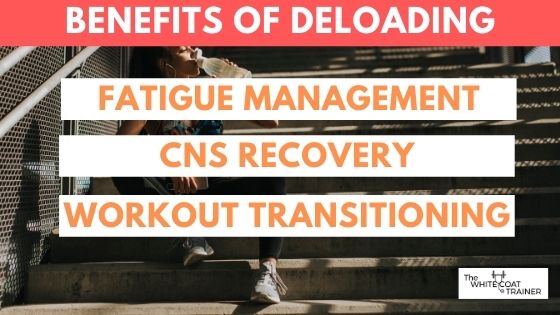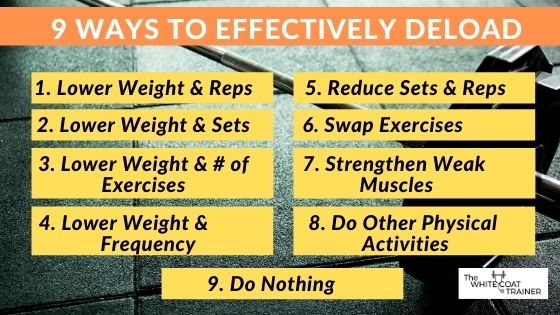Are you interested in doing a deload week but you don’t know how or if you should take one?
If so, you’re in the right place.
After reading this article you’ll learn:
- The benefits of taking a deload week,
- How often you should deload, and
- 9 effective ways to do it.
Let’s get started.

What Is A Deload?
A deload is a planned period of reduced intensity or volume from your workout program.
In other words, you are taking a strategic break from your usual training intensity.
Oftentimes, you might still be working out to some degree, but you’re using this time to give your body a break from intense training.
The most common ways to deload include reducing the weights and/or the number of sets and reps you perform.
What Are The Main Benefits Of Taking A Deload Week?
Taking a deload from your workout can provide you with both physical and psychological benefits.
These include:
- helping to avoid physical overtraining,
- decreasing your injury risk,
- allowing you to plan your next workout routine,
- and giving you time to mentally decompress from the stress of tough workouts.
Let’s go over the primary deload week benefits in more detail.
Fatigue management & injury prevention
When you train on a regular basis with the principle of progressive overload, you will inevitably reach a period of excessive fatigue and decreased performance.
In other words, you will eventually run out of steam.
This will happen to you at some point or another.
Now, it’s important to note that there will be normal fluctuations in your performance on a day-to-day basis, but the general trend should be up.
When you notice that your progress stagnates, or even declines, it’s time to take a step back and re-evaluate.
If you choose to continue pushing through this fatigue- you run the risk of a condition known as overtraining.
This happens when your workload exceeds your recovery capabilities.
Early signs of overtraining include decreased strength and performance and increased soreness/pain.
In the long term, this can lead to physical injury and psychological distress.
A deload phase can help you avoid overtraining, burnout, and long-term injury by reducing the intensity of your exercise schedule.
Central nervous system recovery
Secondly, hard training can be mentally taxing as well.
I’m sure you’ve had days where you just can’t get your mindset into workout mode.
This could be from mental fatigue and central nervous system (CNS) fatigue.
It’s through your nervous system that your muscles are able to generate force. Excessive training will slowly diminish your nervous system’s ability to sustain continued results.
Taking a break can allow you to relax your mind and your CNS as your body heals from the micro-trauma caused by your workouts.

Workout planning
Lastly, a deload week can be helpful when you’re switching your workout routine.
By decreasing your training intensity, you can give your body time to adjust to your new workout and/or new exercises.
During this time, you can also re-evaluate your current routine and re-establish new fitness goals and direction.
This can rekindle the desire to work out again, and is a key strategy for long term consistent training.
Does a Deload Week Make You Stronger?
Deload weeks can make you stronger if your training leading up to it was challenging enough to induce muscular adaptations.
When you strength train, your muscles are in a state of breaking down.
Believe it or not, exercise is inherently a catabolic process that leads to short-term muscle damage.
You don’t get stronger or build muscle during your workout. You get stronger as you are recovering.
The more you workout, the more your body has to recover, and the stronger you will get (as long as you let the recovery happen.)
Strength is built during periods of rest.
But…
It’s important to understand that your body can’t recover from high-intensity training every single week.
That’s why strategic periods of reduced training can aid the muscle recovery process.
Now, you have to be honest with yourself.
If your workouts aren’t that challenging at all, then you might not even need to deload.
However, if you are constantly doing an intense workout on a consistent basis, a programmed deload is just what the doctor ordered!
How Often Should You Have A Deload Week?
There are two schools of thought.
Some argue that you should deload only when you begin to experience reduced performance or increased fatigue. Others recommend that you should deload every 4-8 weeks, long before your performance begins to decline.
I’m in the latter camp.
I prefer that you take a deload week every 4-8 weeks, depending on your program, your skill level, and your goals.
My deloading week often occurs after a 4-6 week training block.
How Many Weeks Do You Deload?
Many people will deload for one week at a time, which is the standard recommendation.
However, the length of your deload period can vary depending on how long the previous training cycle was and how hard you were training during the previous weeks.
It also depends on what you decide to do on that deload week.
More on that later.
Otherwise, you can consider deloading for fewer days, such as 5 days.

Will I Lose Gains Or Muscle If I Take a Week Off?
A common question that is often asked is – “Do you lose muscle on a deload?”
You will not lose muscle if you take a week off, especially if you maintain some level of physical activity during the deload.
With that said, studies have noted that it is possible to lose muscle if you do ABSOLUTELY NOTHING for a few days.
Another study saw muscle loss after 10 days of detraining.
The good news is, your body is quick at regaining lost muscle and strength after a period of rest.
If you plan your deload correctly, you will be surprised to find that your body doesn’t lose any strength or muscle in the long term. Rather, it can help boost muscle size and strength!
To decrease the risk of muscle or strength loss, here’s what you should do:
- Make sure that you are eating a sufficient amount of calories to help your body and muscles repair from your training. Don’t drop your caloric intake by a large margin.
- Stay well hydrated. This is always good advice, no matter what your fitness goal is.
- Do some type of activity, even if it’s just once or twice during your week.
Now, let’s go over what to actually do during your week.
What Do You Do During A Deload Week?
So, how is a deload week structured? When planning your break, there are several ways to reduce your training volume and intensity.
Here are the 9 best deload strategies you can use.
9 Ways To Deload Effectively
1. Reduce weights & repetitions
- Drop the weight of the exercises you are performing by 10-20% and do half the repetitions that you normally do.
2. Reduce weight & sets
- Drop the weight of the exercises you are performing by 10-20% and do half the sets that you normally do.
3. Reduce weight & number of exercises
- Drop the weight of the exercises you are performing by 10-20% and do half as many exercises that you normally do.
4. Reduce weight & frequency
- Drop the weight of the exercises you are performing by 10-20% and decrease the number of times you workout by half. (For example 2 days instead of 4 or 1.5 days instead of 3).
5. Keep the weight the same & reduce sets and reps
- If you really can’t stand the idea of using lighter weights, another way to deload is to keep the weight the same but cut the number of sets and reps you do by 50-75%.
- Keep in mind that this strategy might not allow your CNS to recover all the way.
- You can also combine this with reducing the number of exercises and your training frequency if needed.
6. Do different exercises
- Completely swap the exercises you are performing with easier variations while decreasing the weight by 20%.
7. Strengthen neglected muscles
- You can use this time to really focus on strengthening weak muscle groups that you tend to ignore.
- Common examples include your upper back, middle traps, forearms, serratus anterior etc.
8. Do other forms of active recovery
- Do something fun that you normally don’t make time for such as swimming, rock climbing, or incline walks on the treadmill etc.
9. Do nothing
- Only use this deload strategy if you are absolutely fried, mentally and physically.
- If this is the case, I recommend doing some type of light workout somewhere in the middle of the recovery week.

How Should My Diet During Deload Be?
During a deload, you should keep your diet relatively consistent to when you were training. It’s only through adequate nutrition that your body will be able to fully recover from your weeks of hard training.
If fat loss is your goal, you can decrease your caloric intake by a small amount since you aren’t training as hard. But it’s better to err on the side of keeping it the same.
This isn’t the time to set a large calorie deficit!
On the other hand, if gaining muscle size is your goal, feel free to eat at a slight caloric surplus.
What Should You Do After Your Deload Week?
After a deload week, you should begin a new training cycle using a moderate intensity. This gives your body a chance to accustom itself to heavy weight again.
This reintroduction phase can be as short as 1 week.
If you are a beginner, you might be able to pick up right where you left off. It all depends on how your feel, and how the weights are moving.
Other Related Questions
How Do You Know If You Are Overtraining?
You are overtraining if you are:
- experiencing more muscular soreness/pain than usual,
- noticing your performance at the gym is declining, and
- you are beginning to have negative sentiments towards your workouts.
If you follow my recommended 30-minute workout routines, it is highly unlikely that you would ever reach a state of overtraining.
However, if your workouts are very challenging and push you to your limits on a regular basis, then you certainly need to be on the lookout for signs and symptoms of overtraining.
Should I Deload or Take a Week Off?
It is better to deload and keep your body active in some way, rather than taking a week off completely.
You could use this time to perform exercises that you don’t typically do in your normal training, or a different kind of physical activity altogether.
Either way, the break from your usual training will help build your desire to work out regularly again by the time your deload is over.
Can You Do Cardio On a Deload Week?
You can do cardio on a deload week, assuming that you perform it at a minimal to moderate intensity and it doesn’t induce high levels of fatigue.
In fact, many people do cardio on their rest days (aka active rest days).
But don’t forget what the purpose of a rest week is. It’s to let your body recover from your training.
If you are not careful, the stress from running during a deload can impair your recovery and be just as strenuous as lifting.
As a good rule of thumb, keep your cardio duration to under 30 minutes, and don’t get into a heart rate above 160 bpm.
Do Beginners Need to Deload?
It is always good to get into the habit of planning strategic breaks from training, even if you are a beginner.
You might be hesitant to take a deload as a beginner because you want to continue taking advantage of “newbie gains.”
This is one of the most exciting times in your fitness career. Newbie gains are where you can increase the weight and/or the reps you are doing in every single training session.
Left unchecked, you can often run yourself into a wall and potentially injure yourself from “ego lifting.”
Taking a planned break is never detrimental and can keep your body and your desire healthy for longevity.
Can You Deload For 2 Weeks?
Deloading for longer than 1 week can have a negative impact on your progress and should only be done if absolutely necessary.
In the long run, it probably won’t matter that much and you will probably be fine.
But in the short term, two weeks is sufficient time to begin losing some of your strength (if strength training is something that you care about).
Do I Need A Deload Week If I’m Doing Calisthenics?
Calisthenics is a form of resistance training just like weight training. The potential of overtraining, burnout, and getting injured are still present, even if you are only training with your bodyweight.
Therefore, you should deload on a regular basis if you’re doing calisthenics consistently.
A Workout Program With Properly Timed Breaks
If you are looking for a simple workout program that:
- uses only the most effective exercises,
- combines the best workout splits and training protocols,
- has planned deload phases,
- and only takes 30 minutes a day…
then check out The White Coat Trainer’s Strength Program For Busy Professionals.

So Are Deload Weeks Important?
So there you have the benefits of deload weeks, along with how you should do them, and how often you should consider taking one.
When done correctly, it can help you experience muscle growth, strength gain, and mental resilience.
Now I want to hear from you.
Do you regularly plan breaks from your training?
Why or why not.
Comment below and let us know!
